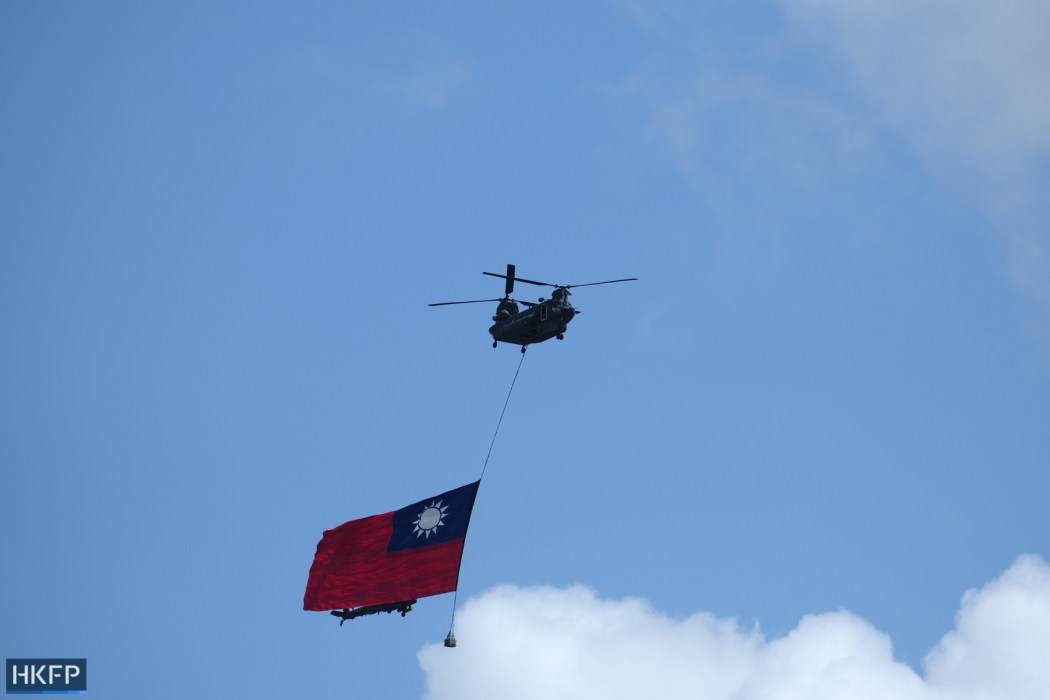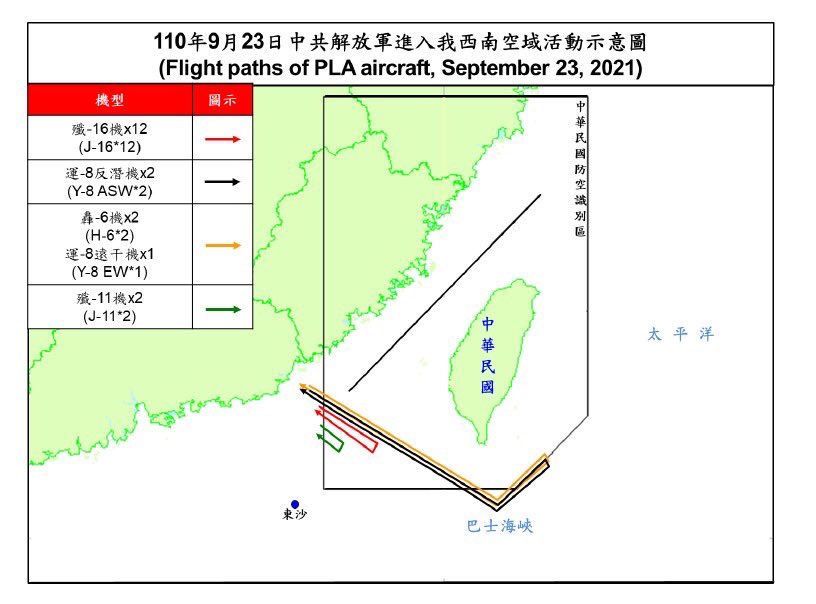As Taiwan celebrated its Double Ten National Day long weekend with a grand parade, fireworks and other festivities, one could be forgiven for thinking that life was absolutely normal on the island. This would be despite the stir caused when 150 Chinese military planes flew into Taiwan’s Air Defense Identification Zone (ADIZ) over five days of the previous week and Taiwan’s president appealed for international help to defend the island.
Over the past two years, China has become more forceful in its actions towards Taiwan, especially in flying regularly into the ADIZ, which is not airspace but a zone in which foreign planes are expected to identify themselves. It has reached a point where Taiwan has gotten used to such incursions, which after all, are not territorial intrusions.

Experts see the flights as designed to train pilots, to pressure the Taiwanese air force and to signal Beijing’s displeasure, but not as a sign of an impending attack.
However, the incursions from October 1-5 were different in several ways. First, the sheer number with 38, 39, and 56 planes on three of the days, each of which were new daily highs. Second, the formations included not just fighters and anti-submarine planes, but H-6 bombers capable of carrying nuclear strike weapons. Most ominously, several groups flew into the ADIZ at night, showing that the PLA now has a 24-hour capability to launch mass aerial sorties.

In any future conflict, these are precisely the type of aerial intrusions Taiwan should expect.
The subsequent response of President Tsai Ing-wen and members of her cabinet reflected a heightened sense of concern. In an article in Foreign Affairs on October 5, Tsai appealed for the international community to defend Taiwan, arguing that it was on the “frontline” in a contest between democracy and authoritarianism. One day earlier, on October 4, Foreign Minister Joseph Wu spoke to Australian media and asked for assistance from that country.

That same week, Defence Minister Chiu Kuo-cheng raised some eyebrows at home when he told a legislative committee that China might be able to launch a “full-scale invasion” by 2025 with a decent chance of success. And on October 7, US media reported that the US has had a few dozen Special Forces and Marines in Taiwan training local soldiers over the past year. The presence of US troops in Taiwan, even just as trainers and in such low numbers, might represent a red line for Beijing, though its reaction was fairly muted.
All this should seem to signify a greater urgency in defending Taiwan’s security, especially the defence minister’s invasion assessment which should have set alarm bells ringing. However, the administration’s international appeals contrast with the lack of public messaging at home in letting Taiwanese know about the greater possibility of invasion. So either Tsai and Wu are being disingenuous in what they are saying to the world by exaggerating the threat from China, or they are telling the truth but cultivating a dangerous sense of complacency at home.

The authorities have indeed taken steps such as making huge arms purchases from the US, and working on domestic programmes such as submarines, corvettes, and surface-to-air missiles. They have also announced the intention to reform Taiwan’s military reserve system. But they have refrained from extending male conscription, which lasts only four months, in contrast to Singapore and South Korea, which both have conscription of at least 20 months. The short duration means training is inadequate or even useless, according to experts as well as those who have undergone it.
Another issue that should concern Taiwan’s leaders is their expectation of US and other international support in times of conflict. While the idea of a global coalition led by the US might sound like a reasonable way to deter China, recent developments seem to indicate otherwise.

For instance, the incursion of 150 planes into Taiwan’s ADIZ was considered by some to be aimed not just at Taiwan but also at a multinational flotilla led by two American and one UK aircraft carrier engaging in a joint training exercise in waters near Okinawa to the north of Taiwan. Far from seeming intimidated at the fact that a massive fleet of 17 warships from six nations was sailing together, China was sending its own warning message.
From the South China Sea to Hong Kong to the Huawei Meng Wangzhou case when Beijing reacted by arresting two Canadians, China under Xi Jinping has shown little inclination to back down when faced with international criticism and pressure. The US withdrawal from Afghanistan under humbling circumstances as well as the AUKUS submarine partnership, which triggered a spat with the jilted French, will hardly have discouraged Beijing.
Conversely, moves like AUKUS, the multinational flotilla featuring two US carriers, and the open admission that US military trainers are in Taiwan show that the US is also looking to be ready for future conflict.
While people in Taiwan can enjoy normalcy for the time being, it remains to be seen whether the government has the will to take firm but unpopular steps domestically or whether it will keep its people in blissful ignorance. But the situation in the Taiwan Strait entered a new stage last week and will only become more tense as time goes on.
Support HKFP | Policies & Ethics | Error/typo? | Contact Us | Newsletter | Transparency & Annual Report | Apps
| HKFP is an impartial platform & does not necessarily share the views of opinion writers or advertisers. HKFP presents a diversity of views & regularly invites figures across the political spectrum to write for us. Press freedom is guaranteed under the Basic Law, security law, Bill of Rights and Chinese constitution. Opinion pieces aim to point out errors or defects in the government, law or policies, or aim to suggest ideas or alterations via legal means without an intention of hatred, discontent or hostility against the authorities or other communities. |
Help safeguard press freedom & keep HKFP free for all readers by supporting our team

More HKFP OPINION:
HKFP has an impartial stance, transparent funding, and balanced coverage guided by an Ethics Code and Corrections Policy.
Support press freedom & help us surpass 1,000 monthly Patrons: 100% independent, governed by an ethics code & not-for-profit.










